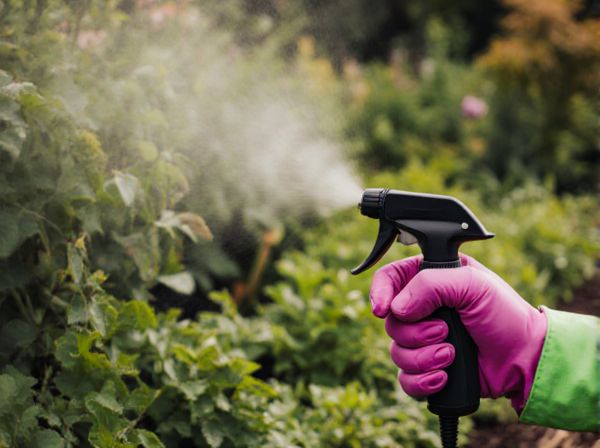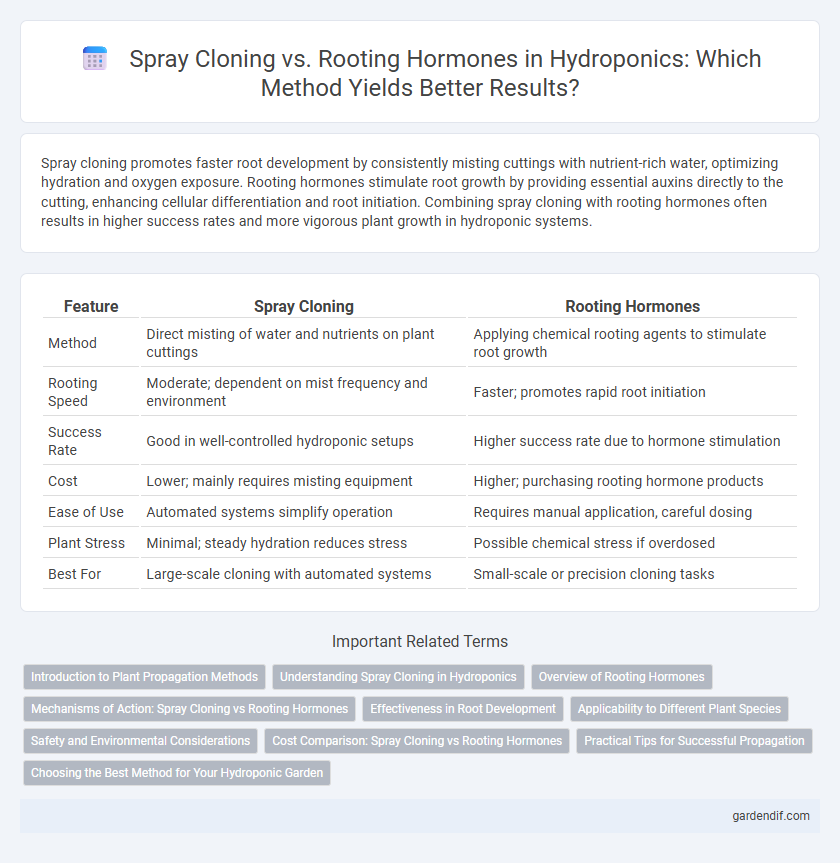
Spray Cloning vs Rooting Hormones Illustration
Spray cloning promotes faster root development by consistently misting cuttings with nutrient-rich water, optimizing hydration and oxygen exposure. Rooting hormones stimulate root growth by providing essential auxins directly to the cutting, enhancing cellular differentiation and root initiation. Combining spray cloning with rooting hormones often results in higher success rates and more vigorous plant growth in hydroponic systems.
Table of Comparison
| Feature | Spray Cloning | Rooting Hormones |
|---|---|---|
| Method | Direct misting of water and nutrients on plant cuttings | Applying chemical rooting agents to stimulate root growth |
| Rooting Speed | Moderate; dependent on mist frequency and environment | Faster; promotes rapid root initiation |
| Success Rate | Good in well-controlled hydroponic setups | Higher success rate due to hormone stimulation |
| Cost | Lower; mainly requires misting equipment | Higher; purchasing rooting hormone products |
| Ease of Use | Automated systems simplify operation | Requires manual application, careful dosing |
| Plant Stress | Minimal; steady hydration reduces stress | Possible chemical stress if overdosed |
| Best For | Large-scale cloning with automated systems | Small-scale or precision cloning tasks |
Introduction to Plant Propagation Methods
Spray cloning and rooting hormones are essential techniques in hydroponic plant propagation, each enhancing new plant growth through distinct mechanisms. Spray cloning utilizes fine mist to maintain optimal humidity around cuttings, promoting faster root development without soil. Rooting hormones contain auxins like indole-3-butyric acid (IBA), which stimulate root initiation and increase success rates in vegetative propagation.
Understanding Spray Cloning in Hydroponics
Spray cloning in hydroponics enhances root development by continuously misting cuttings with nutrient-rich water, creating optimal humidity and oxygen levels. This technique reduces the risk of fungal infections compared to rooting hormones, which rely on auxins to stimulate root growth chemically. Hydroponic spray cloning systems improve propagation efficiency by promoting faster, more uniform root establishment without the variability seen in hormone-based methods.
Overview of Rooting Hormones
Rooting hormones are essential bioactive compounds used to stimulate root development in plant cuttings, containing auxins such as indole-3-butyric acid (IBA) or naphthaleneacetic acid (NAA) to enhance cellular differentiation and root initiation. These hormones accelerate the rooting process by promoting root primordia formation, improving the success rate and growth uniformity in hydroponic cloning systems. Using rooting hormones in hydroponics ensures more efficient propagation, leading to healthier and faster-growing transplants compared to methods like spray cloning without hormone treatments.
Mechanisms of Action: Spray Cloning vs Rooting Hormones
Spray cloning promotes root development by delivering fine mist formulations that keep cuttings hydrated and stimulate cellular activity through natural growth enhancers. Rooting hormones, typically containing auxins like indole-3-butyric acid (IBA) or naphthaleneacetic acid (NAA), chemically trigger root initiation by altering gene expression at the cellular level. While spray cloning relies on maintaining optimal moisture and environmental conditions to encourage root growth, rooting hormones directly activate root primordia formation through hormonal signaling pathways.
Effectiveness in Root Development
Spray cloning enhances root development by providing constant moisture and oxygen to cuttings, resulting in faster and more uniform root growth in hydroponic systems. Rooting hormones, typically composed of auxins like indole-3-butyric acid (IBA), chemically stimulate root initiation and increase the rate of root formation. Combining spray cloning methods with rooting hormones maximizes root development effectiveness, improving plant propagation success rates in hydroponics.
Applicability to Different Plant Species
Spray cloning suits fast-rooting plants like herbs and soft-stemmed vegetables, offering uniform moisture and nutrient delivery to cuttings. Rooting hormones, typically auxin-based powders or gels, enhance root initiation across a broader range of species, including hardwood cuttings in trees and shrubs. Selecting between spray cloning and rooting hormones depends on plant species' specific rooting tendencies and propagation requirements.
Safety and Environmental Considerations
Spray cloning offers a safer alternative to rooting hormones by eliminating chemical exposure risks, making it ideal for organic hydroponic systems. Rooting hormones often contain synthetic auxins that can pose environmental hazards if not disposed of properly, potentially contaminating water sources. Opting for spray cloning reduces chemical runoff and supports sustainable hydroponic practices, aligning with eco-friendly cultivation principles.
Cost Comparison: Spray Cloning vs Rooting Hormones
Spray cloning systems generally require higher upfront investment due to specialized equipment but lower ongoing costs as they reduce the need for consumable rooting hormones. Rooting hormones involve continuous purchasing expenses and can increase overall operational costs despite minimal initial outlay. Evaluating long-term expenses, spray cloning often proves more cost-effective by minimizing product waste and improving cloning success rates.
Practical Tips for Successful Propagation
Spray cloning offers precise moisture control by misting cuttings, promoting faster root development while minimizing fungal issues, making it ideal for delicate plants. Rooting hormones, such as auxin-based gels or powders, stimulate root growth by enhancing cell differentiation and can be applied directly to cutting bases for improved success rates. For best propagation results, maintain consistent humidity and temperature, use sterile tools to prevent contamination, and tailor hormone concentrations based on plant species sensitivity.
Choosing the Best Method for Your Hydroponic Garden
Spray cloning offers precise moisture control and faster root development in hydroponic systems, while rooting hormones enhance the likelihood of successful root formation by stimulating cell growth. Selecting the best method depends on the plant species, environmental conditions, and available equipment within your hydroponic garden. Combining both techniques can maximize propagation efficiency and improve overall plant health in controlled environments.
Spray Cloning vs Rooting Hormones Infographic

 gardendif.com
gardendif.com